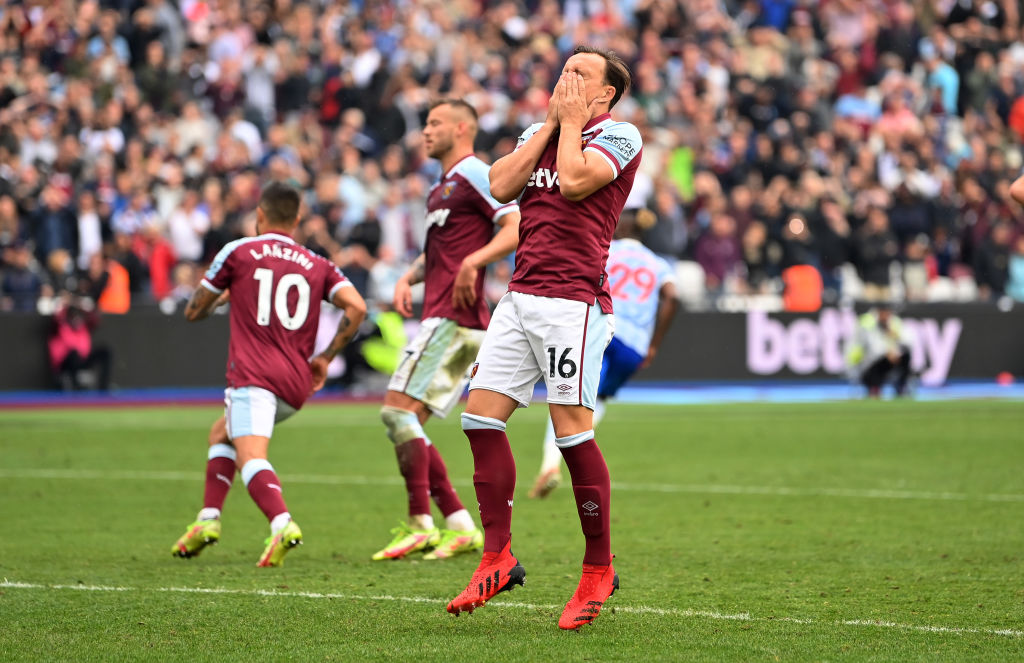Does bringing substitutes on for penalties ever work?
Mark Noble isn't alone: Marcus Rashford and Jadon Sancho were brought on as Euro 2020 final substitutes purely for the penalty shootout

When Gareth Southgate missed that penalty at Euro 96, which eventually led to his quasi-national treasure status, England fans criticised then head coach, Terry Venables for not utilising his substitutes bench in the entire 120-minute encounter with the Germans.
In the aftermath of this summer’s defeat to Italy in the Euro 2020 final, Southgate was broadsided by many England fans for doing the exact opposite – bringing on players cold into a penalty shootout situation. At the end of extra time, both Marcus Rashford and Jadon Sancho came on as substitutes and took penalties without playing any part in the match itself.
And seemingly, managers haven't learned from just two months ago, with David Moyes opting to bring on Mark Noble in the embers of West Ham's defeat to Manchester United at the weekend. OK - it wasn't a shootout: but might as well have been, for the sudden death aspect of rescuing the result for the Irons.
Who is right? England fans in 2021 or England fans in 1996?
Like all decisions, it shouldn’t be judged on the outcome but the process that went into it. Bad decisions can have good outcomes (See: Appointing Big Sam to be England Manager in 2016) and good decisions can have bad outcomes.
In 1996, Robbie Fowler was Liverpool’s regular penalty taker and had been brought on with 10 minutes remaining of England’s quarter-final against Spain to take the fifth spot kick. When Fernando Hierro struck the bar with Spain's first attempt and David Seaman beat Miguel Nadal’s effort away, Fowler's services were rendered irrelevant.
Yet come the semi-final Fowler remained obstinately on the bench. Instead, a centre back winning only his ninth cap with no penalty experience had to volunteer – and we don’t need David Coleman to tell us what happened next.
Get FourFourTwo Newsletter
The best features, fun and footballing quizzes, straight to your inbox every week.
Speaking to Sky Sports before this summer’s tournament Fowler insisted Venables should have put him on against Germany as well.
He said: "I only played two games - I came on against Holland and I came on against Spain and was down to take the fifth penalty. I was delighted we went through but devastated I never got to score the winning penalty!"
Guy Mowbray commentating on the BBC on Sunday evening seemed to speak for the whole nation when he feared that the Italians would play keep ball for the remainder of the extra time period to deny England the chance to bring on Marcus Rashford and Jadon Sancho ahead of the shootout.
Like Fowler 25 years ago, Rashford is a regular penalty for one of England’s biggest clubs. Outside of Harry Kane, he was the squad member with the most experience of taking penalties. But in order to get their takers on Southgate and Steve Holland had to overrule a cardinal footballing superstition, by making the changes at a defensive set-piece. Then we all saw three unsettling additional minutes where Rashford played right back.
Make no mistake had Rashford not come on and England lost on penalties there would have been an inquest of a different kind.
In 2018, Rashford came off the bench with seven minutes remaining against Colombia and as a 20-year-old scored in that World Cup shoot out. The following year his first-ever Manchester United penalty was a 94th-minute spot-kick away at Paris Saint-Germain, where he needed to beat Gianluigi Buffon to advance to the Champions League quarter-finals.
However, because he and Sancho missed against Italy, Southgate's decision to bring them on at the very end of extra time has come under intense scrutiny.
Geir Jordet, a football psychology researcher undertook a study of all penalty shootouts at World Cups, European Championships and Copa Americas between 1976 and 2004. He founf that (unsurprisingly) attackers are better than defenders at scoring penalties; that players aged 23 and under performed better than older players; and that fatigued players (those who play 120 minutes) are less successful than substitutes.
These factors should have meant that Southgate was increasing his probability of success by bringing on the 23-year-old Rashford and 21-year-old Sancho for Kyle Walker and Jordan Henderson, both aged 31.
What is the penalty shootout record for substitutes brought on late in extra time?
The phenomenon of substitutes brought on almost solely to take a penalty at major tournaments is quite rare.
We looked at penalty shootouts in major international competitions going back to the 1982 World Cup, the 1976 Euros, the 1990 Africa Cup of Nations and the 2011 Copa America (the only Copa America with extra time), to find substitutes who came on
Pierre Littbarksi was the first such substitute in 1986. Littbarski replaced defender Norbert Eder for West Germany with three minutes remaining in their World Cup quarter-final against hosts Mexico. He took the fourth penalty and scored to win the shootout.
The unified Germany repeated this trick in the aforementioned Euro 96 semi-final with Thomas Strunz replacing Steffan Freund in the 118th minute before scoring the second of eventually six successful German penalties.
Since 1996, six last minute outfield substitutes brought on to take a penalty (selected as one of the first five takers) at a major tournament have failed.
In that time, only two have joined Littbarksi and Strunz in converting their penalties in the same manner: Andy Delort (Algeria) and Lumor Agbenyenu (Ghana) have been successful, both in the 2019 African Cup of Nations.
So going back to 1986, that's a 40% success rate overall for last-minute penalty substitutes.
Over the same period substitutes who came on after the 100-minute mark but not at the very end of the game in major tournaments have a 77% success rate (17 out of 22).
The sample sizes are small but the discrepancy in the results suggests that there is some truth in the notion that bringing a player on ‘cold’ for a shootout is bad strategy.
If a relatively similar degree of penalty skill is assumed between these two cohorts of players, the remaining possible factors explaining the discrepancy in spot-kick success would appear to be either pressure or readiness.
Were Rashford and Sancho too ‘cold’ to take a penalty? Possibly. Maybe even, probably. Were they the wrong players to trust? Absolutely not.
Southgate has taken England from the nadir of elimination against Iceland to a World Cup semi-final and a European Championship final in less than five years. If there’s anyone that will learn from this experience and make more informed, better decisions come Qatar 2022 it will likely be the man who has consistently modelled decency, humility and courage in a sport and society that doesn’t always reward those attributes.
Subscribe to FourFourTwo today and get three issues delivered for just £3. The offer ends October 17, 2021.
READ NEXT
RICH JOLLY How to beat Bielsa: Why Leeds United's biggest weakness lies in their 'spare man' system
RANKED! Every Premier League kit this season from worst to best
BRENTFORD How the Bees' Moneyball philosophy overcame play-off heartbreak to make it back to the promised land

